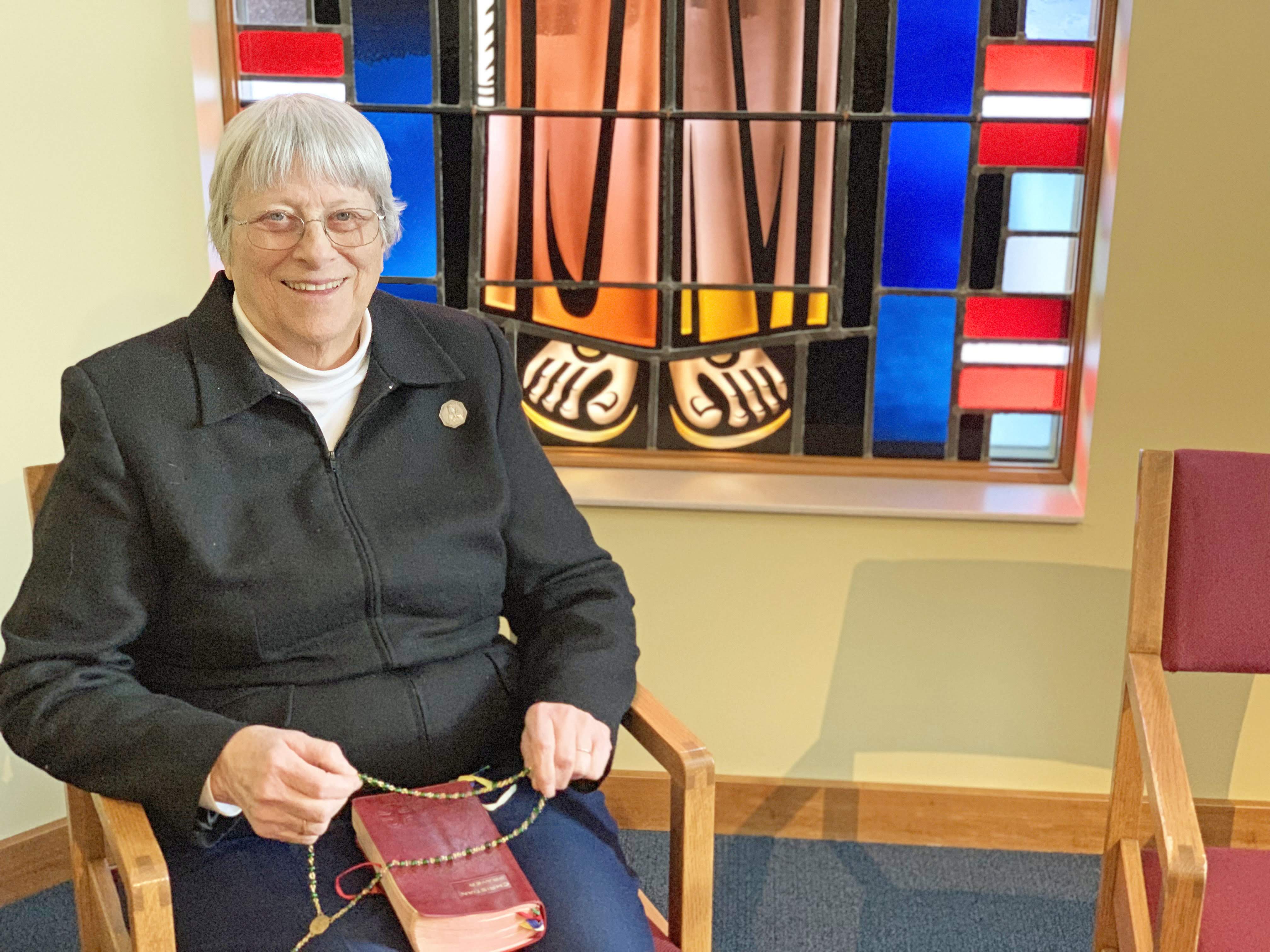God loves you and has a plan for your life .... YOUR VOCATION
Have you ever considered "Religious Life" as your possible way of life?
Explore this page to learn more about God's call to consecrated life with the Sisters of the Sorrowful Mother. Please click on the + tabs below to learn more.

Remember that your life is a gift from God and each one is called into this world for something greater than we can simply see with our physical eyes so if you feel a nagging in your heart, pay attention as God may be calling you to a specific way of life.
Here are few points to guide you in your prayer and discernment:
- Do you feel a yearning desire to know God, Love Him, and serve Him more?
- Do you feel that God may be inviting you to use the gifts and talents you have in His service and for His people in a very specific way?
- Do you find that a career is not enough but you are looking something more?
- Are you familiar with Consecrated Religious Life? and/or what they do? https://www.ihmvocations.org/copy-of-national-vocation-awareness-week
- On this website you can find some materials to help you as you make this journey. https://nrvc.net/374/publication/4808-discernment
Here are other suggestions to help you in this process:
- If you feel that the Lord may be calling you, that means you have to find time to pray a little more with the intention; to know what way of life He is calling you to? https://www.usccb.org/prayers/prayers-vocations
- Do you have a spiritual director? or other person with whom you can share with, your spiritual journey?
- Are you still unsure about what could be your potential vocation and your future? e-mail or talk with a Sister. A Sister can help you talk through these thoughts and your questions and concerns about being called to a religious life. Sister Katherine Marie would be happy to chat with you. You can e-mail her at vocations4ssm@gmail.com or call 920-230-2050. or at 920 385 8192

Religious formation is a lifelong process. During this time, we make our commitment to God, to the Church, and to the SSM Congregation. It is a process of continual renewal that needs to be nurtured and sustained - fostering personal and communal spiritual growth. Initial formation is a 9 year period consisting of several formative stages.
Who are the Sisters of the Sorrowful Mother?
Who can become a Sister of the Sorrowful Mother?
- To love and serve the Lord by standing with Mary Our Sorrowful Mother as She stands under the Cross of Jesus who continues to suffer in our brothers and sisters in todays' world.
- To live and work with others who share the same love and passion for the Lord and within His Church by: healing, teaching, comforting, strengthening, encouraging others on the faith journey and striving to seek God’s will above all.
- To engage in embracing diversity as we minister in the U.S., in the Caribbean (Grenada, St. Lucia, Trinidad), the Dominican Republic, Austria, Germany, Italy, Brazil, and Tanzania.
- Personal and Communal prayer times
- Personal prayer time – a time to come closer to the Lord; to speak to Him, listen to Him and to enter into a conversation with Him.
- Spiritual reading time
- Daily attendance at Mass
- Sharing of, as well as preparing, meals with the Sisters with whom she lives
- Socializing/having fun times/leisure times usually with with Sisters with whom she lives but can be with others as well
- Exercising (whatever contributes to a Sister staying healthy for her own sake, the sake of becoming her best self and enhancing her ability to be a life-giving person in community and ministry)
What are the Entrance Requirements for becoming a Sister of the Sorrowful Mother?
- Age: Not younger than 20 or older than 45 at the date of entrance into the postulancy
- Marital Status:
- Single
- If previously married, the person may begin postulancy two years after a valid change in marital status, widowhood or annulment.
- Family responsibilities:
- Free of dependents or minor children
- No financial or legal responsibilities for a family member or relative
- Faith:
- Baptized and confirmed in the Catholic faith
- If a convert to the Catholic faith, one must live the faith for at least two years prior to entering postulancy
- Health:
- Must be physically, emotionally and mentally healthy, that is, able to participate in ministry and community life
- Must have completed three years of recovery after treatment of an addiction
- Education:
- U.S. Citizens: High School education with a year’s working experience following high school; prefer completion of an associate’s degree, a bachelor’s degree or its equivalent
- English-speaking Caribbean Citizens:
- Five General Certificates of Education *(GCE) or Caribbean Examination Council (CXC) subjects required
- An associate degree, bachelor’s degree or equivalent is preferred
- Spanish-speaking Caribbean Citizens:
- The ability to speak and understand the English language
- Secondary education or is equivalent
- An associate degree, bachelor’s degree or equivalent preferred
- Citizenship, immigration, and naturalization
- Birth certificate, naturalization papers required
- A valid passport required
- For other requirements and further questions do not hesitate on contacting SSM Director of Vocation Ministry, Sister Katherine Marie, at vocations4ssm@gmail.com
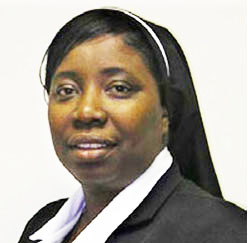 “Many different parts of our Franciscan heritage inspire me, but the one that speaks to me the most, is the simple Prayer of St. Francis…”Lord, make me an instrument….” In the past I simply mouthed those words; now I pray the prayer more consciously. I realize that in that prayer lies the fullness of the “Kingdom of God” to which I am called to contribute to make a present reality. Hence, to the measure that I am at peace is the same measure that I give to the world….A Franciscan way of living, therefore, calls me into right relationship with God, self, creation and others, and I cannot think of a better way to do this, than to be in right relationship with myself. It is a challenge, yet it is possible. My prayer is that as a Sister of the Sorrowful Mother I will continue to strive to live simply and consciously, with a deeper love and respect for others, so that my example may speak for itself.”
“Many different parts of our Franciscan heritage inspire me, but the one that speaks to me the most, is the simple Prayer of St. Francis…”Lord, make me an instrument….” In the past I simply mouthed those words; now I pray the prayer more consciously. I realize that in that prayer lies the fullness of the “Kingdom of God” to which I am called to contribute to make a present reality. Hence, to the measure that I am at peace is the same measure that I give to the world….A Franciscan way of living, therefore, calls me into right relationship with God, self, creation and others, and I cannot think of a better way to do this, than to be in right relationship with myself. It is a challenge, yet it is possible. My prayer is that as a Sister of the Sorrowful Mother I will continue to strive to live simply and consciously, with a deeper love and respect for others, so that my example may speak for itself.”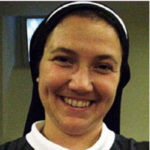 “Franciscan Spirituality was fundamental for me to live my faith more joyfully, long before I entered the Congregation. During my novitiate, I had the grace to immerse myself in the places of Francis and Clare and to “absorb” their charism by the living testimony of their current spiritual children. The study of the Franciscan Sources and the Third Order Rule was very important to me to help to get closer to the heart and faith of Francis. His style of praying has also greatly impacted my way to pray. Through the study and testimony of Brothers and Sisters who follow in the footsteps of Francis and to reach Christ, I learned to love this spirituality even more and I desire to be guided by it throughout my consecrated life. My desire and commitment in my daily life is to be able to incarnate the Franciscan simplicity, joy, community and gratitude for all the gifts I received.”
“Franciscan Spirituality was fundamental for me to live my faith more joyfully, long before I entered the Congregation. During my novitiate, I had the grace to immerse myself in the places of Francis and Clare and to “absorb” their charism by the living testimony of their current spiritual children. The study of the Franciscan Sources and the Third Order Rule was very important to me to help to get closer to the heart and faith of Francis. His style of praying has also greatly impacted my way to pray. Through the study and testimony of Brothers and Sisters who follow in the footsteps of Francis and to reach Christ, I learned to love this spirituality even more and I desire to be guided by it throughout my consecrated life. My desire and commitment in my daily life is to be able to incarnate the Franciscan simplicity, joy, community and gratitude for all the gifts I received.”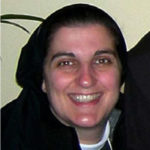 “I have been attracted by the person of Francis since childhood; his ability to rejoice in everything, the joy of seeing God in the most humble of creatures; being trustful in his heart like a child who expects everything from his parents and knows that all his needs will be satisfied. All these aspects of the Franciscan Spirituality have accompanied me as a Sister of the Sorrowful Mother. In the last few years, Francis’ unceasing reference to the Mercy of God supported me very much. God does not disdain any of us and it is through our poverty that His grace and power shine. My continuous experience of God’s Mercy helps my heart to be more merciful to our Sisters and those close to me. All of this makes me think of Mary, and, in a particular way, of standing under the cross. In her moment of utter poverty and untold suffering she became a mother in the fullness of motherhood, welcoming in her heart all the sons and daughters who were entrusted to her by her dying Son.”
“I have been attracted by the person of Francis since childhood; his ability to rejoice in everything, the joy of seeing God in the most humble of creatures; being trustful in his heart like a child who expects everything from his parents and knows that all his needs will be satisfied. All these aspects of the Franciscan Spirituality have accompanied me as a Sister of the Sorrowful Mother. In the last few years, Francis’ unceasing reference to the Mercy of God supported me very much. God does not disdain any of us and it is through our poverty that His grace and power shine. My continuous experience of God’s Mercy helps my heart to be more merciful to our Sisters and those close to me. All of this makes me think of Mary, and, in a particular way, of standing under the cross. In her moment of utter poverty and untold suffering she became a mother in the fullness of motherhood, welcoming in her heart all the sons and daughters who were entrusted to her by her dying Son.”
 “God was speaking very strongly in my head. Every evening my mother told stories of different people in the world who did not know Jesus…This was really the beginning of my vocation. I loved Jesus so much that I felt sorry that others did not know him. This desire was deepening more and more in my heart. Then I met the Sisters of the Sorrowful Mother in Rome. They were very welcoming and announced Jesus by their simplicity, humility, hospitality.”
“God was speaking very strongly in my head. Every evening my mother told stories of different people in the world who did not know Jesus…This was really the beginning of my vocation. I loved Jesus so much that I felt sorry that others did not know him. This desire was deepening more and more in my heart. Then I met the Sisters of the Sorrowful Mother in Rome. They were very welcoming and announced Jesus by their simplicity, humility, hospitality.” “I had the SSMs in school. In my little town of Villanueva, the Sisters were a quiet, yet powerful presence. One quality of the Sisters that was greatly appreciated was their respectful acceptance of who we were and of our culture. I was attracted to their prayerful presence. Each morning I would sit in church and listen to them praying in their chapel, right off the sanctuary. As I saw them in the community among us and visiting the elderly, the sick, teaching us I grew more and more in my desire to BE LIKE THEM. I believe the deep, simple faith, and prayer at home, and the lives of the Sisters were what God used to call me to religious life.”
“I had the SSMs in school. In my little town of Villanueva, the Sisters were a quiet, yet powerful presence. One quality of the Sisters that was greatly appreciated was their respectful acceptance of who we were and of our culture. I was attracted to their prayerful presence. Each morning I would sit in church and listen to them praying in their chapel, right off the sanctuary. As I saw them in the community among us and visiting the elderly, the sick, teaching us I grew more and more in my desire to BE LIKE THEM. I believe the deep, simple faith, and prayer at home, and the lives of the Sisters were what God used to call me to religious life.” “I met the SSM’s at Mother of Perpetual Help School in Milwaukee where I attended grade school. I was drawn into prayer through them, especially for the four years I sang in the children’s choir. My parents were religious people, and I learned service and prayer by things I saw them do. My Dad drove the Sisters when they needed a driver. My Mom often sent food to our neighbors when we had family gatherings so those not able to get out could share our celebration. I witnessed their prayer and goodness. I was also influenced by the day of adoration held monthly in the parish, specifically for the purpose of praying that more men and women would answer their call to ministry.”
“I met the SSM’s at Mother of Perpetual Help School in Milwaukee where I attended grade school. I was drawn into prayer through them, especially for the four years I sang in the children’s choir. My parents were religious people, and I learned service and prayer by things I saw them do. My Dad drove the Sisters when they needed a driver. My Mom often sent food to our neighbors when we had family gatherings so those not able to get out could share our celebration. I witnessed their prayer and goodness. I was also influenced by the day of adoration held monthly in the parish, specifically for the purpose of praying that more men and women would answer their call to ministry.” “Sr. Rosalie, my Mother’s sister, an SSM, was always welcoming at St. Michael’s Hospital in Stevens Point. Sr. Kiliana and Sr. Cornelia visited our house when I was in 5th grade. At that time, I believed to be a Sister was the “best” thing I could be. Mom and Dad lived their faith fully and loved me. Teachers in school encouraged me. The parish with its liturgies and sacraments supported me. My older sister, Sr. Mary Michel, who entered ahead of me, attracted me and led the way.”
“Sr. Rosalie, my Mother’s sister, an SSM, was always welcoming at St. Michael’s Hospital in Stevens Point. Sr. Kiliana and Sr. Cornelia visited our house when I was in 5th grade. At that time, I believed to be a Sister was the “best” thing I could be. Mom and Dad lived their faith fully and loved me. Teachers in school encouraged me. The parish with its liturgies and sacraments supported me. My older sister, Sr. Mary Michel, who entered ahead of me, attracted me and led the way.” “When I was confirmed in the 8th grade I received a sense of “service.” It developed during high school. I wanted to be a nurse, but also serve God in a special way. I entered nurses’ training, followed one year of liturgical celebrations, and with association with the Sisters my call became more clear…with the help of one Sister I was able to “let go” of nursing to enter the convent. My family was supportive—we were good practicing Catholics. My Mother had a great love of the Rosary. I entered on the Feast of St. Anne.”
“When I was confirmed in the 8th grade I received a sense of “service.” It developed during high school. I wanted to be a nurse, but also serve God in a special way. I entered nurses’ training, followed one year of liturgical celebrations, and with association with the Sisters my call became more clear…with the help of one Sister I was able to “let go” of nursing to enter the convent. My family was supportive—we were good practicing Catholics. My Mother had a great love of the Rosary. I entered on the Feast of St. Anne.” “When in 8th grade a Sister asked who wanted to go to the Convent, my hand went up, much to my surprise and hers. But my hand stayed up and has gone up again as my vocation became more specific and at each crossroad I knew I loved Jesus in the Eucharist. And when he asked various things of me the love had to become action.The spirituality of my mother and father was foundational. The Sisters who taught us catechism were so awesome and spoke of how God was. The example of the Sisters…spoke to my heart—in great silence.”
“When in 8th grade a Sister asked who wanted to go to the Convent, my hand went up, much to my surprise and hers. But my hand stayed up and has gone up again as my vocation became more specific and at each crossroad I knew I loved Jesus in the Eucharist. And when he asked various things of me the love had to become action.The spirituality of my mother and father was foundational. The Sisters who taught us catechism were so awesome and spoke of how God was. The example of the Sisters…spoke to my heart—in great silence.”–Sister Margaret Mary Troy
You can contact our Vocation Director, Sr. Katherine Marie at vocations4ssm@gmail.com or via cell (920)385-8192.
Interested in learning more about religious life? We would love to hear from you!

Contact us @
920-385-8192 (cell)
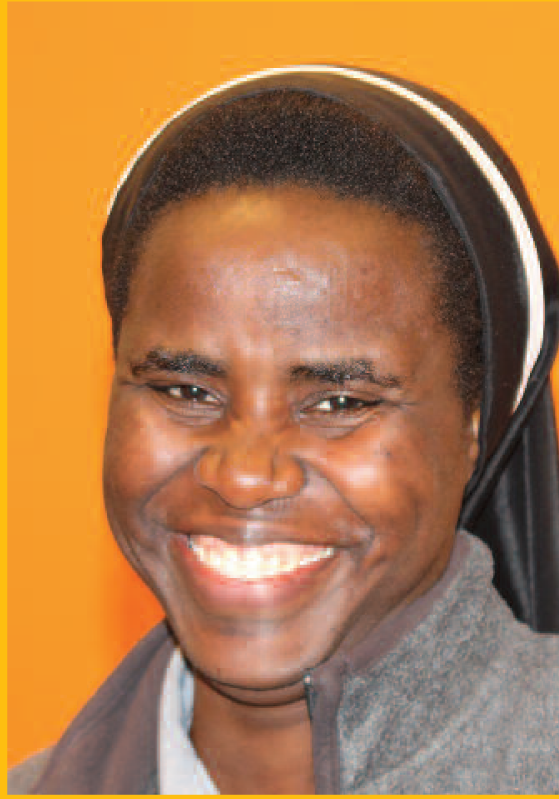
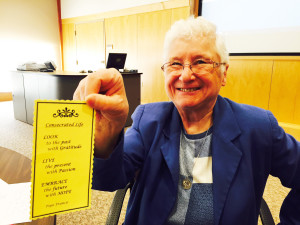
Read Sister Dorothy Ann’s Blogs:
Locations:
The St. Clare of Assisi Region of the Sisters of the Sorrowful Mother has ministries across Wisconsin; in Tulsa, Okla.; Denville, NJ; and the Dominican Republic. Internationally we have locations in Germany, Italy, Austria, Brazil, Tanzania and the Caribbean islands of Grenada, St. Lucia and Trinidad/Tobago.
What It Means to Be a Sister
Watch the video below, which includes interviews with Sisters on the meaning of religious life.
